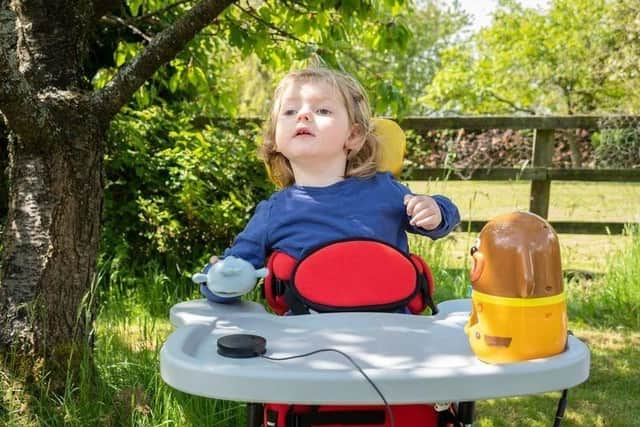Buckinghamshire family call for more research to help daughter Emmy, 2, who is blind and cannot walk or talk
and live on Freeview channel 276
The family of a two-year-old girl, who is blind and cannot walk or talk, are calling for more research into Vici syndrome, a rare and life-limiting inherited medical condition.
Emmy Romer-Lee was diagnosed with Vici syndrome at 18 months old. The condition is caused by faults in the EPG5 gene which result in symptoms including heart problems, delayed development, progressive deterioration of the nervous system, seizures and repeated infections.
Advertisement
Hide AdAdvertisement
Hide AdLittle Emmy is one of only 100 people worldwide with the condition for which there is no cure. Most children do not live beyond their fifth birthday.


For parents Ellie and Jon, who live in Great Horwood, the diagnosis came as a terrible shock.
Ellie said: “We were completely blind-sided’ by such a devastating and life-limiting diagnosis. Vici syndrome is incredibly rare and affects so many parts of the body that Emmy has complex epilepsy and immune deficiency which results in recurrent respiratory and urinary tract infections and neuropathic pain.”
There is no cure for Vici syndrome and treatment involves managing the symptoms. Ellie explains that one of the hardest symptoms to deal with is seeing Emmy in pain:
Advertisement
Hide AdAdvertisement
Hide AdShe added: “Emmy has neuropathic pain which means she used to scream and scream and at its worst, it has gone on for four or five days, day and night, but the medications have helped and the frequency and duration of these episodes has reduced. Emmy also has to take antibiotics every day to reduce the risk of infections.
“The diagnosis has had a dramatic impact on our lives, but Emmy is amazing. She is calm and content, even serene, but with a brilliantly stubborn determination to try and move.
"She is very communicative once you learn her cues and responds enthusiastically to all kinds of therapies and inputs. Hippotherapy, with horses, is Emmy’s favourite part of the week and it’s just magical to see. This research, although not a cure, could help us manage some of Emmy’s symptoms including the seizures and pain.
Ellie added: “Even Emmy’s five-year-old sister, Tilly, has adapted and is amazing with Emmy and has a very close and loving relationship with her. When she gets home from nursery, the first thing she’ll do is wash her hands and then immediately find Emmy to give her a huge cuddle. This is lovely to see.”
Advertisement
Hide AdAdvertisement
Hide AdEllie and Jon are supporting Action Medical Research’s campaign to raise funds for research being carried at University College London.
The charity’s funding will support the work which ultimately aims to help treat some of the symptoms. The project builds on the discovery that cells from patients with Vici syndrome have problems with their mitochondria – the cell’s energy-generating powerhouses. Research is now under way to see whether existing medicines could help to restore mitochondrial function in patient nerve cells.
Sarah Moss, Director of Communications at Action Medical Research, added: “We are committed to funding research into rare diseases, including ultra rare diseases like Vici syndrome. Our support of early-stage research is important as it is often the starting point for further work that leads to new treatments which can bring hope to families like Emmy’s.”